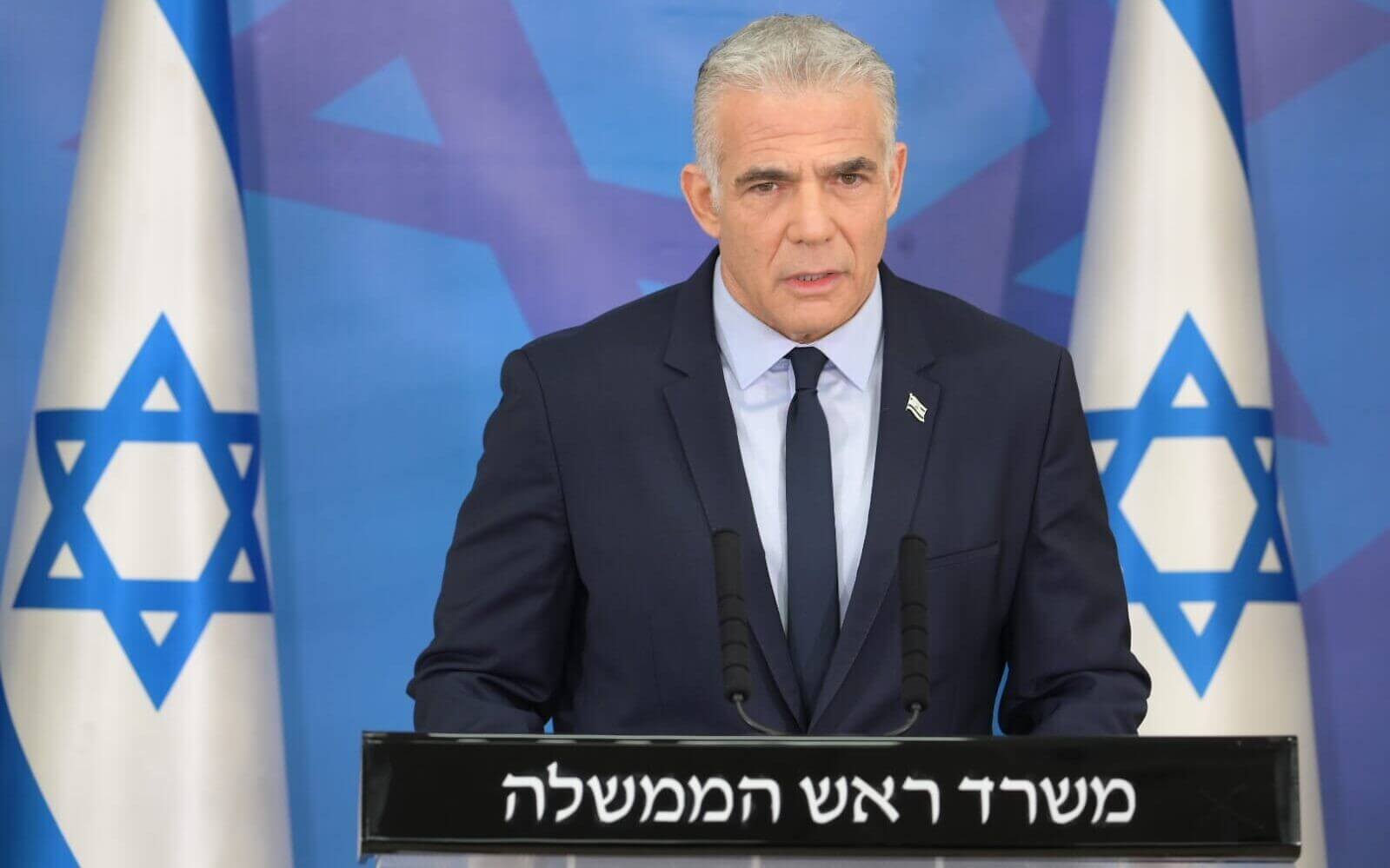Israeli Prime Minister Yair Lapid on Wednesday warned the West against signing a nuclear deal with Iran amid reports that an agreement between Tehran and world powers is imminent.
Addressing the media, Lapid said despite the European Union (EU) making Iran a “final offer” to return to the 2015 nuclear deal, also known as the Joint Comprehensive Plan of Action (JCPOA), it appears that Brussels is willing to make further concessions to get Iran to re-join the JCPOA. “This is not the first time this has happened. The countries of the West draw a red line, the Iranians ignore it, and the red line moves,” he noted.
He claimed that the deal on the table right now is a bad one and would give Iran $100 billion a year following sanctions removal. “This money will not build schools or hospitals. This is a hundred billion dollars a year that will be used to undermine stability in the Middle East and spread terror around the globe,” Lapid asserted.
He said this money will not only be used to fund Iranian paramilitary groups like the Islamic Revolutionary Guard Corps (IRGC) and the Basij but will also fund more attacks on American bases in the Middle East, support militant groups in the region loyal to the Islamic Republic, and strengthen Iran’s nuclear programme.
PM Lapid:
— Prime Minister of Israel (@IsraeliPM) August 24, 2022
“On the table right now is a bad deal. It would give Iran a 100 billion dollars a year. This money will not build schools or hospitals. This is a 100 billion dollars a year that will be used to undermine stability in the Middle East and spread terror around the globe. pic.twitter.com/X3diiU39cy
He added that the deal “endangers the independence of the International Atomic Energy Agency (IAEA) [and] creates huge political pressure on them to close open cases without completing a professional investigation.” Lapid cited IAEA chief Rafael Grossi’s recent comments that Iran has no credible explanation for uranium traces found at several laboratories.
In an interview with CNN, Grossi said, “Dropping probes is not something the IAEA does or will ever do without a proper process. The key to this lies in a very simple thing: Will Iran cooperate with us?”
“So far Iran has not given us the technically credible explanations we need to explain the origin of many traces of uranium, the presence of equipment at places. This idea that politically we are going to stop doing our job is unacceptable for us,” he added.
Keeping this in mind, Lapid asked, “How is it possible to sign a deal with Iran when this is what the body responsible for supervising a deal says?” He noted that once the deal is signed Iranian sectors like banking will be removed from US sanctions, which would allow Tehran to easily launder money. “In our eyes, it does not meet the standards set by President Biden himself: preventing Iran from becoming a nuclear state,” he said.
"Give us the necessary answers, people & places so we can clarify the many things needed for clarification. We’ll provide a report clarifying what happened and then this idea (IAEA probe which Iran has demanded be closed) will be put to rest,” IAEA Chief @rafaelmgrossi told CNN.
— Iran International English (@IranIntl_En) August 22, 2022
Lapid reasserted that if a deal is signed, it “will not obligate Israel” against taking necessary action to prevent a nuclear Iran. “We are not prepared to live with a nuclear threat above our heads from an extremist, violent Islamist regime,” he stressed..
Israel has for years warned that Iran is building a nuclear weapon and could launch airstrikes against Iran’s nuclear facilities to prevent a nuclear Iran. Israel views a nuclear Iran as an existential threat due to threats by Iranian leaders to “annihilate” Israel.
Israel has also opposed the 2015 nuclear deal, also known as the Joint Comprehensive Plan of Action (JCPOA), and lobbied the US and the European Union (EU) against reviving the deal, arguing that it would allow Iran more time to accelerate its nuclear programme.
Lapid’s remarks came amid reports that Iran and world powers are reportedly on the verge of reviving the JCPOA. In July, the EU proposed a “final text” for reviving the deal following the failure of the year-long Vienna talks. Although Iran said the deal was acceptable, it is still undecided.
Iran also recently demanded that the IAEA drop its investigation into unexplained uranium traces found at nuclear sites across the country. Iran’s atomic energy chief Mohammad Eslami said Iran expects these investigations to end before a deal is reached. “We don’t expect the director general of the agency [Grossi] to utter sentences that are wanted by the Zionist regime [Israel],” he added.
However, a US official claimed this week that Iran has now agreed to allow the IAEA to continue its investigation in order to keep negotiations on the nuclear deal moving forward.

